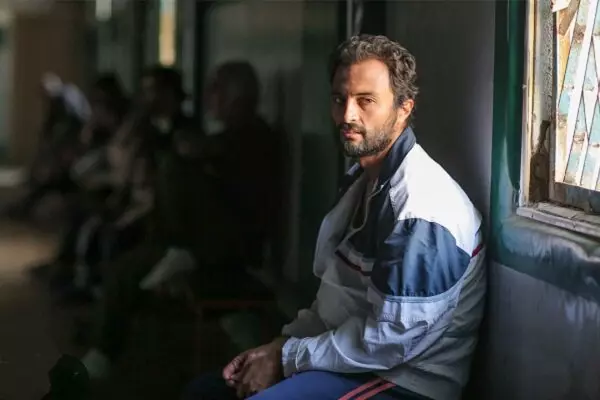
Societal distrust feels as though it’s as high as it’s ever been. People analyze their neighbors in bad faith, believing the worst of them and their intentions while social media and the fourth estate itself follow suit, looking for the least charitable interpretation of any event they come across. It’s enough to drive the calmest person mad and undoubtedly, it probably has. The latest film from Iranian virtuoso director Asghar Farhadi places a mirror in front of modern society and what stares back can be unsettling.
A Hero tells the tale of Rahim (Amir Jadidi) who is serving time in jail for a debt he cannot repay to his vindictive former brother-in-law Bahram (Mohsen Tanabandeh). As Rahim enjoys a two-day leave from jail, he tries to convince his other brother-in-law (Alireza Jahandideh) to devise a way to pay back a portion of the debt. Meanwhile, his girlfriend Farkhondeh (Sahar Goldoost) finds a lost handbag at a bus stop containing some gold coins. She and Rahim get the coins appraised at a pawn shop, but find that they are barely enough to pay half of the debt. After realizing their lack of needed value and feeling increased guilt, Rahim chooses to nobly turn in the bag to a business nearby the bus stop where a woman insisting she’s the rightful owner retrieves it. The prisoner’s good deed is reported to local news outlets who make Rahim a symbol for good and local feel good hero. But, as the public rallies around him and attempt to help him straighten out his life, sentiment soon turns as his intentions and the truth about who found the coins and what they attempted to do with them at first are called into question. Rahim is soon forced to try to find the woman who never identified herself public in order to clear his name and stop a rising firestorm against him.
We currently inhabit deeply cynical times where every institution and individual’s motives are called into question and approached from a vantage point of negativity. In that regard, A Hero feels like a movie made specifically to capture our current moment. The film is a profound and at times maddening statement on the cynicism of modern society and the propensity for humans toward pessimism, doubt, and misery, taking what should be grand, feel good moments and turning them into nightmarish experiences that leave people more bitter and worse off than they were before they happened.
Farhadi does a masterful job in slowly degrading what at first felt like a feel good redemption story of a man branded a criminal under unfair circumstances who does the right thing into a scathing critique of vengefulness, bureaucracy, and fickle public sentiment until the viewer themselves begins to question just what was real and what wasn’t in everything that they’ve witnessed firsthand. The tension builds slowly but deliberately as we glance at how the media handles the story, its affect on how the public views Rahim, and how public sentiment trickles down even to those who began as advocates for him and his case. The emotions that the audience feels in watching this unfold are amplified by the familiar feelings that arise in seeing how institutions handle Rahim and his story, how social media fans the flames, and how groupthink affects his life as everything unravels around him. It’s the familiarity of it all that creates connection between the film and its viewers, not just through the compelling script, but by the parallels between the fictitious world depicted and our daily lives.
All of the characters that Rahim encounters in his story are ones we’ve known in ourselves, the faceless politicians that have established unforgiving debtors’ prisons where the unlucky are punished harshly, Bahram (Mohsen Tanabandeh) who is unforgiving in his vindictiveness against Rahim, even though his initial claim against him is somewhat understandable, the job that promises him work then begin to question his story after social media pressure, and finally, the charitable organization who at first try to assist him with moving on with his life and then bow to public pressure, abandoning him to save their own reputation. These very real characters succeed in making the story feel real, a mirror to the crushing attitude of distrust most of seem to have for each other at the moment, so pervasive that even the decent among us either succumb to it or become consumed by it.
Amir Jadidi’s portrayal of helplessness is one of the most emotionally impactful and empathetic performances of the year. His Rahim is a character you cannot help but feel sympathy for as the audience knows his intent and his actions but are forced to watch as he is ground down further than he already is. What makes Rahim and his story so impactful is the truth in it. He doesn’t always make perfect choices or sound decisions, but what viewers are made to feel and know is that his heart is in the right place and he is trying; an empathetic description of who we all aim to be. The rest of the ensemble is equally great at filling in the world surround Rahim in all its facets from helpfulness to doubt to viciousness to cowardice. It is a world that feels real and evokes equally real emotion as we watch it all unfold.
A Hero is a movie fitting of our time with Asghar Farhadi continuing his mastery of storytelling by holding a mirror up to our current attitudes and treatment of those around us. It’s topicality makes it an empathetic, immersive watch, buoyed by a wonderful performance from lead actor Amir Jadidi. Thought-provoking and entertaining, this one is a definite must see.
Image: Amazon Studios

